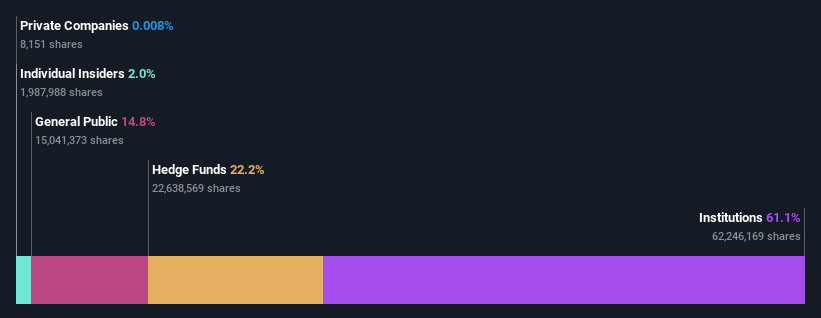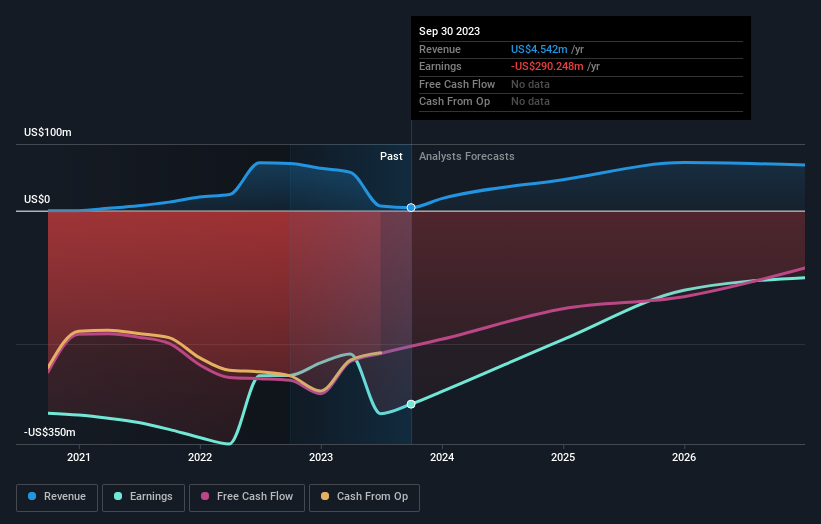After losing 76% in the past year, Atara Biotherapeutics, Inc. (NASDAQ:ATRA) institutional owners must be relieved by the recent gain
Key Insights
Institutions' substantial holdings in Atara Biotherapeutics implies that they have significant influence over the company's share price
The top 8 shareholders own 52% of the company
To get a sense of who is truly in control of Atara Biotherapeutics, Inc. (NASDAQ:ATRA), it is important to understand the ownership structure of the business. And the group that holds the biggest piece of the pie are institutions with 61% ownership. In other words, the group stands to gain the most (or lose the most) from their investment into the company.
After a year of 76% losses, last week’s 103% gain would be welcomed by institutional investors as a possible sign that returns might start trending higher.
In the chart below, we zoom in on the different ownership groups of Atara Biotherapeutics.
Check out our latest analysis for Atara Biotherapeutics
What Does The Institutional Ownership Tell Us About Atara Biotherapeutics?
Many institutions measure their performance against an index that approximates the local market. So they usually pay more attention to companies that are included in major indices.
Atara Biotherapeutics already has institutions on the share registry. Indeed, they own a respectable stake in the company. This suggests some credibility amongst professional investors. But we can't rely on that fact alone since institutions make bad investments sometimes, just like everyone does. It is not uncommon to see a big share price drop if two large institutional investors try to sell out of a stock at the same time. So it is worth checking the past earnings trajectory of Atara Biotherapeutics, (below). Of course, keep in mind that there are other factors to consider, too.
Institutional investors own over 50% of the company, so together than can probably strongly influence board decisions. It looks like hedge funds own 22% of Atara Biotherapeutics shares. That worth noting, since hedge funds are often quite active investors, who may try to influence management. Many want to see value creation (and a higher share price) in the short term or medium term. EcoR1 Capital, LLC is currently the company's largest shareholder with 9.9% of shares outstanding. Meanwhile, the second and third largest shareholders, hold 8.2% and 7.0%, of the shares outstanding, respectively.
We did some more digging and found that 8 of the top shareholders account for roughly 52% of the register, implying that along with larger shareholders, there are a few smaller shareholders, thereby balancing out each others interests somewhat.
While studying institutional ownership for a company can add value to your research, it is also a good practice to research analyst recommendations to get a deeper understand of a stock's expected performance. Quite a few analysts cover the stock, so you could look into forecast growth quite easily.
Insider Ownership Of Atara Biotherapeutics
While the precise definition of an insider can be subjective, almost everyone considers board members to be insiders. The company management answer to the board and the latter should represent the interests of shareholders. Notably, sometimes top-level managers are on the board themselves.
I generally consider insider ownership to be a good thing. However, on some occasions it makes it more difficult for other shareholders to hold the board accountable for decisions.
Our most recent data indicates that insiders own some shares in Atara Biotherapeutics, Inc.. In their own names, insiders own US$2.4m worth of stock in the US$124m company. This shows at least some alignment, but we usually like to see larger insider holdings. You can click here to see if those insiders have been buying or selling.
General Public Ownership
The general public, who are usually individual investors, hold a 15% stake in Atara Biotherapeutics. This size of ownership, while considerable, may not be enough to change company policy if the decision is not in sync with other large shareholders.
Next Steps:
I find it very interesting to look at who exactly owns a company. But to truly gain insight, we need to consider other information, too. Consider for instance, the ever-present spectre of investment risk. We've identified 5 warning signs with Atara Biotherapeutics (at least 2 which are a bit unpleasant) , and understanding them should be part of your investment process.
Ultimately the future is most important. You can access this free report on analyst forecasts for the company.
NB: Figures in this article are calculated using data from the last twelve months, which refer to the 12-month period ending on the last date of the month the financial statement is dated. This may not be consistent with full year annual report figures.
Have feedback on this article? Concerned about the content? Get in touch with us directly. Alternatively, email editorial-team (at) simplywallst.com.
This article by Simply Wall St is general in nature. We provide commentary based on historical data and analyst forecasts only using an unbiased methodology and our articles are not intended to be financial advice. It does not constitute a recommendation to buy or sell any stock, and does not take account of your objectives, or your financial situation. We aim to bring you long-term focused analysis driven by fundamental data. Note that our analysis may not factor in the latest price-sensitive company announcements or qualitative material. Simply Wall St has no position in any stocks mentioned.

 Yahoo Finance
Yahoo Finance 

